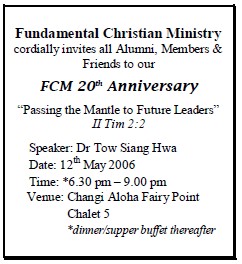The Judas Gospel: Bad News of Betrayal – Part I
(Message delivered by Dr Jeffrey Khoo at the True Life Church 10.30 am Service, Apr 23, 06)
Text: John 6:66-71
Introduction
According to The New York Times of April 6, 2006, The Judas Gospel together with the other Gnostic Gospels “have produced a new generation of Christians who now regard the Bible not as the literal word of God, but as a product of historical and political forces that determined which texts should be included in the canon, and which edited out. For that reason, the discoveries have proved deeply troubling for many believers.”
Is this true? Has the Gnostic Gospels produced a generation of Christians who no longer believe that the Bible they have in their hands today to be the literal Word of God? Is this true of True Lifers? Has the so-called Gospel of Judas troubled you who have trusted in Christ as Lord and Saviour. Those of us who are truly born again, born of the Spirit, born from above should not be troubled by the Judas Gospel for the Holy Spirit that indwells us is the Spirit of truth and guides us into all truth (John 16:13). What is truth? God’s Word is truth (John 17:17). Jesus said, “My sheep hear my voice … and they follow me” (John 10:27). The Lord says His sheep will be able to discern His good voice of truth from the strange voice of falsehood.
The Gospel of Judas is not good news at all but another bad news of betrayal—Jesus is betrayed once again by Judas in this recently found “Gospel” named after him. Actually, the title—“The Gospel of Judas”— misleads. The title gives the impression that it was Judas himself who had written this Gospel. No, Judas wrote no Gospel. This so-called “Gospel” was not written by Judas but by some unknown person who for some twisted reason wanted to revise Biblical history by turning the villain Judas Iscariot into a hero—the best and most loyal disciple of Jesus.
Now, let me critique the Gospel of Judas (according to the text released by the National Geographic Society), and offer three reasons why this Gospel is a fictitious and spurious one.
The Judas Gospel is a Heretical Gospel
The Gospel of Judas begins like this: “The secret account of the revelation that Jesus spoke in conversation with Judas Iscariot.” The fact that the Gospel of Judas is introduced as a “secret account” lets out the “secret” that it is an unorthodox gospel created by the Gnostics who were known for their “secrets.” Prof Tan Kim Huat of Trinity Theological College writing for The Straits Times on April 14, 2006 asked: “Is Gnosticism a variety of Christianity or is it a mutation so dangerous that it should be treated as a heresy?” Our answer to his two part question is, “No, Gnosticism is not a ‘variety of Christianity’ but a totally different religion that is occultic, and yes, it is definitely a heresy by the infallible and authoritative standards of the divinely inspired and preserved Scriptures.”
What is Gnosticism and who were the Gnostics? The word “gnostic” comes from the Greek ginosko which means “to know.” Gnosticism was a 2nd century cult which used the name of Christ to spin a heretical brand of Christianity teaching that (1) salvation requires secret knowledge outside of the Bible that is accessible only to the privileged elite; (2) matter is evil; and (3) Jesus did not really come in the flesh.
The gospel of Christianity is no secret but clearly revealed in the Written Word of God—the 66 books of the Canonical Scriptures. The Apostle John wrote referring to the Canonical Gospels: “But these are written, that ye might believe that Jesus is the Christ, the Son of God; and that believing ye might have life through his name” (John 20:31). The Written Word reveals to us the Living Word, and it is sufficient for us to know how to find salvation in Christ, the only Saviour of the world.
What is the gospel? The word “gospel” (euangelion) literally means “good news.” The Apostle Paul in 1 Corinthians 15:1-4 explains what is the gospel: “Moreover, brethren, I declare unto you the gospel which I preached unto you, which also ye have received, and wherein ye stand; By which also ye are saved, if ye keep in memory what I preached unto you, unless ye have believed in vain. For I delivered unto you first of all that which I also received, how that Christ died for our sins according to the scriptures; And that he was buried, and that he rose again the third day according to the scriptures.” Christ crucified and resurrected is the good news of the forgiveness of sins and eternal life for those who will put their trust in Him.
This knowledge of the gospel is not secret but open. The knowledge of salvation is not far from us, but very near us. The Apostle Paul tells us in Roman 10:8-9, “But what saith it? The word is nigh thee, even in thy mouth, and in thy heart: that is, the word of faith, which we preach; That if thou shalt confess with thy mouth the Lord Jesus, and shalt believe in thine heart that God hath raised him from the dead, thou shalt be saved.” But the Gnostics add to the gospel. They say that it is not enough to know Christ and His resurrection, one must attain to some hidden and mysterious knowledge before one can truly know God and live forever. The Gnostic formula for salvation works like this: “Gospel + Secret Knowledge = Salvation.” It is “another gospel.” Anything that adds to the perfect redemptive work of Christ and the pure content of the Gospel of Christ is heteron euangelion, “another gospel” (Gal 1:6).
The Gospel of Judas can shake the faith of the believer. May we not be so easily shaken in our faith like some of the Christians in the Galatian Church. Paul wrote to chide and warn them, “I marvel that ye are so soon removed from him that called you into the grace of Christ unto another gospel: Which is not another; but there be some that trouble you, and would pervert the gospel of Christ. But though we, or an angel from heaven, preach any other gospel unto you than that which we have preached unto you, let him be accursed. As we said before, so say I now again, If any man preach any other gospel unto you than that ye have received, let him be accursed” (Gal 1:6-9).
The Judas Gospel has a Different Jesus
What kind of Jesus does the Judas Gospel present? The Judas Gospel presents a Jesus who has a habit of laughing at people. He laughs at his disciples for saying grace, he laughs at their questions, he laughs before he speaks, he laughs after he speaks. The word “laugh” appears eight times in the Judas Gospel. This compares with only twice in the whole New Testament and that only in the Gospel of Luke. Jesus said in Luke 6:21, “Blessed are ye that weep now: for ye shall laugh.” In Luke 6:25, Jesus warned that those who laugh now will weep later, “Woe unto you that laugh now! for ye shall mourn and weep.” In John 11:35, we find Jesus weeping. Jesus was “a man of sorrows, and acquainted with grief” (Isa 53:3). He did not come into this world to have a jolly good time, but to suffer, to bleed, and to die for us so that we might be saved.
The Judas Gospel also presents Jesus not as the Creator but a creature. The disciples referred to Jesus not as “the Son of God” (ie, God Himself) but “the son of our god.” Jesus also says that his god is different from the god of his disciples. In the world of the Gnostics there are many gods and many levels of divinity. The highest level is pure spirit. This is typical of the Gnostic thinking that all flesh is evil. Since Jesus is in the flesh, Jesus must be evil and could not have come from the supreme God who is pure Spirit. Then where did Jesus come from? Judas is the one who has the answer. In the Gospel of Judas, Judas tells Jesus, “I know who you are and where you come from. You are from the immortal realm of Barbelo.” Barbelo is one of the inferior gnostic gods from the lower levels of the immortal realm. Jesus himself confesses to Judas that he is not God but one of the twelve angels created by God. Jesus is the first of the twelve angels who is “Seth” and called “Christ.” This is pure nonsense.
The truth is Jesus is God and the Creator of the world. In the very first verse of the Gospel of John, we read, “In the beginning was the Word, and the Word was with God, and the Word was God.” This Word is none other than the Living Word—the Lord Jesus Christ—who created the universe: verse 3 says, “All things were made by him; and without him was not any thing made that was made.” This invisible God and Creator became a human being and took on human flesh to be our Saviour. John 1:14 says, “And the Word was made flesh, and dwelt among us, (and we beheld his glory, the glory as of the only begotten of the Father,) full of grace and truth.” The flesh of Jesus was not at all sinful, evil or bad, but utterly sinless, pure and perfect, “full of grace and truth.”
The mystery of Jesus Christ is a mystery revealed, not for a secretive and elite few but for all to know and believe so that they might be saved from their sins. The Apostle Paul says in 1 Timothy 3:16, “And without controversy great is the mystery of godliness: God was manifest in the flesh, justified in the Spirit, seen of angels, preached unto the Gentiles, believed on in the world, received up into glory.” John 3:16 says, “For God so loved the world, that he gave his only (uniquely) begotten Son, that whosoever believeth in him should not perish, but have everlasting life.”


Kelapa Sawit B-P Church 54th Anniversary Service


